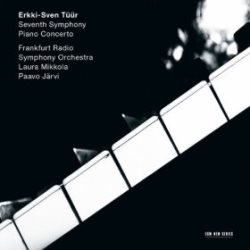| 
|
Erkki-Sven TÜÜR (b. 1959)
Piano Concerto (2006) [21:47]
Symphony No.7 Pietas (2009) [40:43]
Laura Mikkola (piano)
NDR Choir (symphony)
Frankfurt Radio Symphony Orchestra/Paavo Järvi
rec. Alte Oper, Frankfurt, June 2009; hr-Sendesaal, Frankfurt, June 2010
Texts included
ECM NEW SERIES 2341 [62:44]
ECM have already released a number of recordings of Tüür's music and this quite recent one is devoted to two substantial works composed over the last few years. Both are big-boned pieces, of some considerable length and weight although they are quite different in mood and character.
The Piano Concerto is an earlier work composed in 2006. It is a fairly imposing single movement falling into segments reflecting the traditional fast-slow-fast pattern in which all three sections are played without break. The first opens with “a loudly struck bottom C on the piano” onto which low strings successively enter. Although this is not a traditional concerto features such as alternation of soloist and orchestra as well as soloist with orchestra are retained so that dialogue between all concerned is not as absent as one might think. The music builds up to a storming climax and then leads into the middle slower and more lightly scored section which eventually climaxes and rushes into the energetic third section. This opens with a jazzy cadenza and then unfolds with much energy. One might then think that the music is heading towards some powerfully assertive conclusion but the composer thinks otherwise and, “in reaching a climax it turns a strange corner, into a decelerated, spaced-out landscape” (Paul Griffiths). Although it may not be of a purely virtuoso kind, the solo part is quite demanding and its very length and weight call for much stamina on the soloist's part. Laura Mikkola who was one of the most endearing finalists of the 1985 Queen Elizabeth Competition perfectly meets all challenges, technical and musical. She gives a convincing performance of this sometimes exacting, though ultimately quite rewarding work.
The Symphony No.7 Pietas was composed in 2009 and dedicated to the Dalai Lama. It, too, is an imposing work for large orchestra and choir although it may not really be described as a choral symphony. The choir is actually involved in no more than an eighth of this forty-minute work. It plays without break although it, too, falls into four sections. The composer chose the words from diverse sources: Siddharta Gautama (Buddha), Mahatma Gandhi, Jimi Hendrix, Saint Augustine, Mother Teresa and a Deepak Chopra, an Indian-born but American resident endocrinologist and 'thinker' whatever that may mean. It seems that he is also interested in so-called soft medicine and the like. The choral settings are always quite straightforward, syllabic and easy to follow. The main weight falls clearly on the orchestra. This has long sections entirely to itself in which Tüür gives free rein to his formidable orchestral flair and imagination. Some may find the work a bit too long but I have never felt this thanks to the composer's mastery and sureness of touch when working on a large-scale canvas. I was never bored by what I heard although I nevertheless thought that the whole structure might have been tightened here and there. Again, I believe that the composer felt the need to let his music take its time to make its full impact. This is certainly a deeply sincere and honest piece of strongly expressive music that deserves to be heard.
In both works Paavo Järvi leads his fine orchestra with both a sure hand and an indefeasible commitment. A whole-hearted response is elicited from all concerned. Add to this ECM's superb recording and Paul Griffiths' detailed, though sometimes obscure insert notes and one has a very fine release and one that will appeal to all admirers of Tüür's music.
Hubert Culot
 |
 |
|











